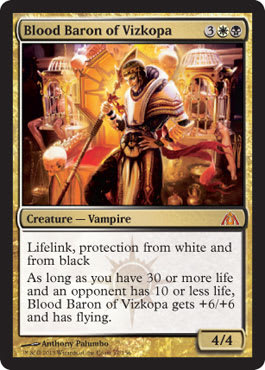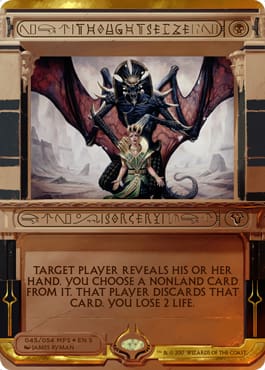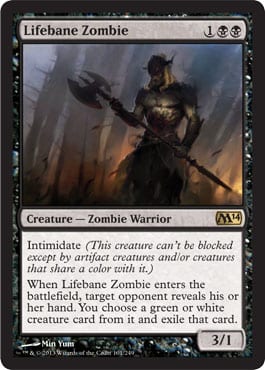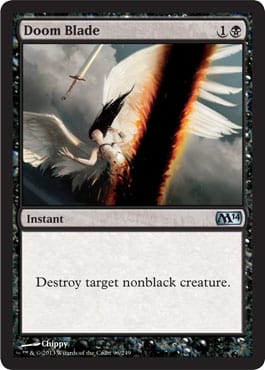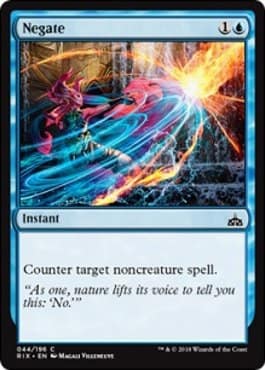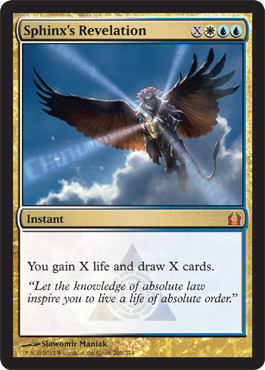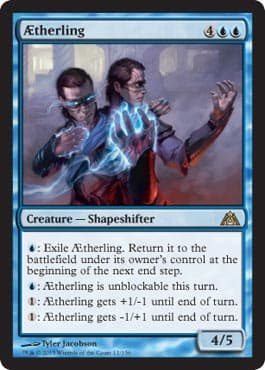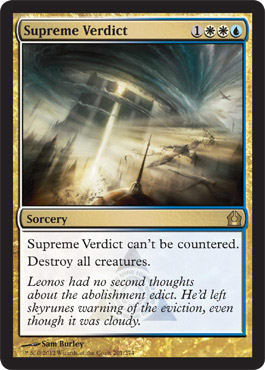In straight W/U, there are very few options for dealing with these creatures without taking a significant amount of damage in the meantime. Blind Obedience was the only real answer, and even that was attached to the plan of having Supreme Verdict or a similar sweeper effect. Black provided me with an excellent answer in the form of Doom Blade and Ultimate Price. Both of these cards are dirt-cheap and are better than countermagic against the R/G deck. Doom Blade in particular could also be leveraged against certain sideboard plans decks like the one W/U Control had adopted while also providing an answer to Mutavault.
Normally, this would be where the mana comes in as the major failing of the deck and I’m forced to shelve it until we obtain better lands. However, with the format growing slower and Temple of Enlightenment being printed, we could get away with ten to twelve scry lands in the main deck and not be punished . . . usually. Suddenly, the mana didn’t consist of a dozen shock lands, and the extra filtering power helped hit the necessary colors on time while not sacrificing main-deck slots. Throw in some other sweet sideboard options, and Esper really comes off as an attractive option.
Here’s my current build:
"Esper Control"
- Creatures (1)
- 1 Aetherling
- Planeswalkers (7)
- 3 Elspeth, Sun's Champion
- 4 Jace, Architect of Thought
- Spells (25)
- 1 Fated Retribution
- 2 Azorius Charm
- 2 Syncopate
- 2 Ultimate Price
- 4 Dissolve
- 4 Sphinx's Revelation
- 2 Thoughtseize
- 4 Supreme Verdict
- 4 Detention Sphere
- Lands (27)
- 4 Island
- 4 Plains
- 1 Watery Grave
- 2 Godless Shrine
- 2 Mutavault
- 3 Temple of Deceit
- 3 Temple of Silence
- 4 Hallowed Fountain
- 4 Temple of Enlightenment
- Sideboard (15)
- 4 Blood Baron of Vizkopa
- 3 Doom Blade
- 2 Thoughtseize
- 1 Revoke Existence
- 2 Fiendslayer Paladin
- 2 Negate
- 1 Dispel
My main change to the Unwin build was a slight mana rebuild, as there are more Mountain decks online, so hitting untapped lands is at a premium. It also makes your Supreme Verdict set a little more timely with the extra white source. Otherwise, I felt the main deck was excellent, with my only potential swap being bringing back Last Breath as an additional answer to Mutavault or Nightveil Specter. In terms of the sideboard, I gained almost no value out of Brimaz, King of Oreskos in any matchup, and I quickly cut those for the usual W/U Control sideboard cards.
Blood Baron of Vizkopa significantly changes how many of your post-boarded games play out. In fact, the best reason to play Esper is that it turns into an iteration of Orzhov Control with more removal and Jace, Architect of Thought alongside Sphinx's Revelation instead of Underworld Connections. That certainly favors you in terms of the disruption and big-threat mirror, and against red decks, it gives you superior options as a streamlined control plan.
Sideboarding against Burn
−3 Elspeth, Sun's Champion−1 Aetherling
+2 Negate
+1 Dispel
+3 Doom Blade
Instead of being weighed down by clunky win conditions and slow removal spells, mine becomes a deck with nine counterspells, cheap ways to kill or disable Firedrinker Satyr, and Mutavault, and my win conditions all gain me life. My mulligans aren’t complete jokes as they are in Game 1, and I have a reasonable streamlining of the deck. Many of my matchups are like this—instead of siding in a few good cards for a given match that are disconnected from my strategy, I am able to accelerate my strategy with cheaper and more specialized cards.
The goal with this kind of transformation is to streamline your deck in every match, which is why the game-one build is suited toward a lot of cheap, general answers and nothing too specialized.
Sideboarding against Mono-Black Control or Orzhov
−2 Azorius Charm−1 Aetherling
+2 Thoughtseize
You don’t need a lot of Verdicts going on since a pair of those and Detention Sphere can keep a resolved Pack Rat in check, and, usually, MBC will force you to deal with one threat at a time. Blood Baron of Vizkopa replaces most of your win conditions, although Elspeth usually wins the game on its own if the opponent doesn’t immediately Hero's Downfall it. The combo of Thoughtseize and countermagic is well-positioned against the opposing deck’s overflow of discard, and, typically, the game devolves into one of three scenarios:
The opponent’s discard and your disruption cancel each other out, and you end up with one or two relevant spells while top-decking – This usually favors you because Esper’s digging spells are more powerful; both Jace and Revelation do a better job of pulling ahead immediately, as compared to Underworld Connections. A well-timed Blood Baron of Vizkopa can also defeat—or at least stalemate—any threat the opponent could potentially have held onto.
The opponent picks off your removal and forces you to beat a Pack Rat or a Lifebane Zombie with Mutavault – This is usually the worst-case scenario, and it’s where your losses come from. You were on the draw, kept a reasonable, but slow, hand, including one or two Detention Sphere and Supreme Verdict. The opponent picked these off with Duress or Thoughtseize, and then forced down a Pack Rat or Lifebane Zombie before you had a chance to start digging. These threats can kill you in three or four turns, and they also pressure any of your Jace plays. Meanwhile, Sphinx's Revelation is still two or three turns away from being any more than a very expensive Divination.
Times like these is when I’m unsure if siding out any number of Supreme Verdict is correct, but the card is just wretched in the average game against MBC. Paying 4 mana at sorcery speed to kill one creature is not a good solution.
The opponent doesn’t pelt you with discard, and you survive with your hand intact – Congratulations, you’ve most likely won the game. Without shredding your hand or applying a quick clock when you lack a removal spell, you run more disruption and card-draw alongside the full set of Blood Barons. The Esper player has every advantage by turn four as long as you hit your land drops.
Sideboarding against R/G Monsters
−1 Dissolve+3 Doom Blade
You barely have to sideboard in this match because your deck is almost perfectly suited toward beating the opponent’s. The only thing you really lack is a cheap refill card, which is why W/U Control with Divination has a better Game 1. Esper gains an edge with Doom Blade and Ultimate Price post-board—both are very effective answers to Mistcutter Hydra and Stormbreath Dragon, two of the scariest cards R/G plays.
R/G players have almost no reasonable way to play around your countermagic, as the vast majority of R/G decks have gone fully midrange. Domri Rade and Xenagos, the Reveler are the only noncreature means those decks play to pull ahead; meanwhile, Detention Sphere, Mutavault, Thoughtseize, and Syncopate are all valid answers to that line. Even if you leave it in play for multiple turns, R/G can’t really ride if to victory if you ever see a Sphinx's Revelation. Fated Retribution is also a massive blowout that deck needs to play around later in the game—you can clear out the opponent’s threats and Planeswalkers in one go.
Sideboarding against W/U Control
−2 Supreme Verdict−1 Syncopate
+2 Thoughtseize
+2 Negate
+1 Dispel
If I expect Brimaz, King of Oreskos, I’ll also swap in Doom Blade.
Here’s how to play the W/U/x Control mirror in three easy steps:
Don’t miss land drops – As with nearly every control mirror throughout the history of Magic, once you start missing land drops, a lot of things need to break your way for you to have a chance at winning. While using scry to dig for key spells is important, remember that you actively want lands seven, eight, and nine. Too many players look for business or sideboard answers while ignoring the long-term states of their mana bases. You really want to be able to cast Jace with protection and, later, Sphinx's Revelation with protection.
In the mirror, I’d much rather keep a hand with five lands, a random spell, and a Jace over one with three lands, Jace, Detention Sphere, Sphinx's Revelation, and Dissolve. The second hand may be far better if I hit a critical mass of lands, but even if I land my turn-four Jace, the first thing I have to do is dig for extra lands with a -2. Even six-land hands are acceptable in the mirror with a Dissolve or Negate so you can make sure you don’t become buried in case of flooding against a more aggressive control player.
Information is huge – Keeping track of hands when you Thoughtseize is pretty much a known quantity at this point. Keeping track of scry and Jace reveals is something a lot of players don’t bother with, and you really should take the few seconds to make a written record of them. Don’t just track what the opponent took into his or her hand either—any spell the player revealed off a Jace split can be important later. In some games, you’ll see every copy of a given spell from your deck, and knowing that the fourth Dissolve is tucked away on the bottom of his or her deck instead of sitting in his or her hand can influence your decision.
Focus on what matters – Some famous sayings throughout Magic can apply to this matchup: “There are no wrong answers, only threats.” “Who’s the beatdown?” “Always be closing.” “Turn down for what.”
Focusing on what matters is important in every game of Magic, but control mirrors are particularly interesting because what matters can quickly shift. Normally, you want to focus on broad spectrums of the game, mana advantage, keeping your life above 0, and so on. In control mirrors, you frequently need to isolate your position in the match and what cards are most important to you at that moment.
Often, battling over Sphinx's Revelation and Aetherling are seen as the most important things in this match. While they can be, I just want to remind players to not be stuck in tunnel vision when assessing threats. Letting smaller Revelations resolve and then fighting over the next important spell is perfectly reasonable. Fighting over Thoughtseize can even be correct at times—it gives one player a huge edge on knowing when to deploy the bulk of his or her resources. If I can leave open Syncopate or Negate early against Thoughtseize, I will, even if it slightly messes up my sequencing.
There isn’t a cheap way to reload, and your countermagic isn’t cheap enough to fight an extended war with. At most, you can have two minor battles on the stack before you simply run out of cards and your opponent is in the same boat. This means both picking your fights and figuring out if your hand can beat a resolved something are fundamental to doing well in the match. Here’s a rough hierarchy of spells, with the caveat that all of these can change based on context.
| Things I’m Most Likely to Fight Over |
|---|
| Aetherling |
| Sphinx's Revelation for 4 or more |
|
— |
| Thoughtseize |
|
— |
| Jace, Architect of Thought |
|
— |
|
— |
| Sphinx's Revelation for 3 or less |
| Blood Baron of Vizkopa (without Supreme Verdict in hand) |
|
— |
|
— |
| Elspeth, Sun's Champion (without Detention Sphere in hand) |
|
— |
| Revoke Existence on Detention Sphere |
| Other creatures |
|
— |
| Everything else |
| Things I’m Least Likely to Fight Over |
I hope this gives you some insight into how the deck wants to play out in various matches and a general idea of sideboarding. I don’t feel that I need to cover every match—the other matches aren’t too interesting from your perspective anyway. Against devotion decks, the match revolves around Supreme Verdict and keeping Gods in check. Against mono-red decks, your life total is at a premium, and countermagic is far more important now that those decks have mostly moved to burn-heavy versions.
If you're just picking up W/U/x Control, I highly recommend starting with straight W/U. Esper stresses sequencing properly and gives you even more options, such as when to Thoughtseize, baiting more creatures into potential Supreme Verdict, and differing values on Jace now that you have instant-speed removal to protect it. You don’t gain a huge number of percentage points, and you make your life that much harder in your everyday decision-making.
If you’re familiar with playing control, though, and are tired of lacking a good 2-cost removal spell, come and join the Esper team!
Josh Silvestri
E-mail me at josh.silvestri at gmail dot com

















